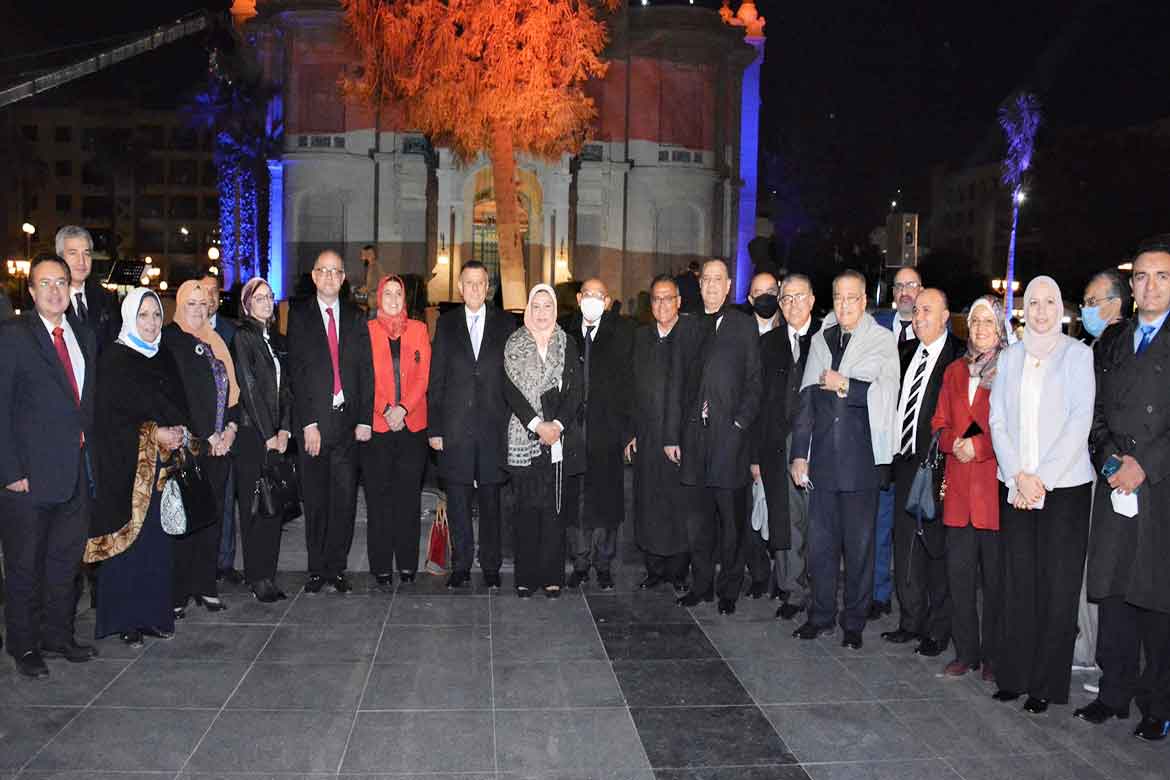
By Photos ... recommendations of the ninth scientific conference of Ain Shams University "The Fourth Generation of Universities between Reality and Aspiration"
The activities of the ninth scientific conference of Ain Shams University, entitled "The Fourth Generation of Universities between Realities and Aspirations," was concluded, which was held from April 6-8 under the auspices of Prof. Dr. Khaled Abdel Ghaffar, Minister of Higher Education and Scientific Research, headed by Prof. Dr. Mahmoud El-Metini, President of the University and President of the Conference, Prof. Dr. Ayman Saleh, Vice President for Postgraduate Studies and Research and Vice President of the Conference, Prof. Dr. Abdul Fattah Saoud, Vice President for Education and Student Affairs, Prof. Dr. Hisham Temraz, Vice President for Community Service and Environmental Development. It included several sessions in the sectors of education and students, creativity and innovation, basic sciences, engineering and technological sciences, humanities, social and educational sciences, and the medical sciences sector.
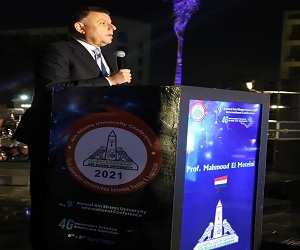 |
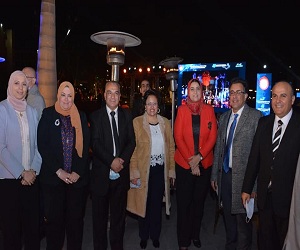 |
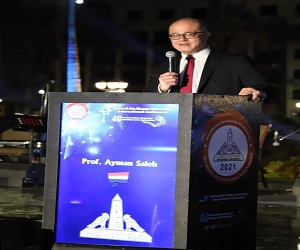 |
||
The recommendations of the conference were as follows:
First, the education and students sector, headed by Prof. Dr. Abdel Fattah Saoud, Vice President for Education and Student Affairs and the supervision of Prof. Dr. Taya Abdel-Latif, Prof. Dr. Tamer Rady, Adviser to the Vice President for Student Activities, and Prof. Dr. Heba Shaheen, Head of the Media Department at the Faculty of Arts, Ain Shams University and Director of the Media Center at the University, which included contributions from Ain Shams University students to include the "AMWHO Simulation Model" under the supervision of Prof. Dr. Karim Al-Batouti, “A simulation model of Ain Shams University Council that shows the role that each faculty can play in transforming the university into a fourth-generation university,” under the supervision of Prof. Dr. Muhammad Safi and Prof. Dr. Ahmed Khalifa, in addition to a session of the iHub Center for Innovation and Entrepreneurship under the supervision of Prof. Dr. Maged Ghonima, Director of the Center, in which the winning ideas of the first places in innovation competitions were presented in the faculties of Ain Shams University and a presentation was made on the ASU Racing Team at Ain Shams University, in addition to an exhibition that included the innovative students' participation in Ain Shams University faculties.
On the sidelines of the sessions' activities, competitions were held for students, and prizes amounting to 140,000 pounds were announced by the sector to the winning students, in addition to honoring the winning teams.
The sector sessions concluded with recommendations directed to higher education institutions:
By deepening the awareness campaigns of its professors, researchers, students, and employees on the importance of creativity, innovation and entrepreneurship, and their use to link the educational and research process in universities with the state's 2030 plan for sustainable development.
Developing teaching methods and curricula to urge undergraduate, BA and postgraduate students to research, apply, innovate, use emerging technologies, work in an interdisciplinary system and link curricula with reality in the labor market and industry.
Organizing training courses and workshops for faculty members, the assisting body and students to develop the conceptual design and principles of creativity, innovation and entrepreneurship to be influential and effective members of the innovative awakening in higher education institutions
Providing an appropriate budget, developing sustainable plans, organizing competitions aimed at attracting innovators and innovators from various disciplines, providing the necessary support to develop their skills and providing material and moral incentives to motivate them to creativity and innovation and work on marketing the outputs of their work.
Encouraging the establishment of applied research centers to attract innovative students and researchers to work on developing solutions, products and services to meet the needs of civil society and industry, and to promote the idea of technology transfer.
Increase inspiring co-working spaces in its college buildings and provide them with the Internet and appropriate display and communication technologies to encourage their professors, researchers, students, and employees from all disciplines to meet and dialogue to generate inter-professional and specialized ideas and to plan for their transformation into projects or start-up companies.
Increasing support and interest in business incubators and accelerators as an open, flexible and supportive environment for innovators and creators to motivate and support them to transform their ideas and research into emerging companies that contribute to the Egyptian economy and the sustainability of higher education institutions.
Increasing communication with graduates to benefit from their experiences in the educational process, participating in training programs in its various faculties, paying attention to activities that contribute to the employment of its graduates and linking them to the labor market, linking the educational process to achieving societal benefit, and including students' community activities in their academic evaluation.
Increase the participation of civil society institutions, the private sector, and government institutions in their educational, research and innovative activities to integrate their institutional, market and industrial experiences, utilize their resources and work on joint projects that benefit the economy and society.
Deepening and increasing cooperation with international universities and companies to exchange experiences and open new research, development, innovation and investment partnerships.
Establishing an investment fund to invest in applied research projects and start-ups and support the innovative and entrepreneurial awakening in them and achieve their plans for sustainable development.
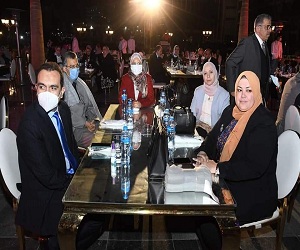 |
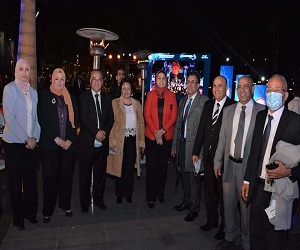 |
|
Second: recommendations of the Engineering and Technological Sector:
Sector Committee, headed by Prof. Dr. Rasha Ismail, Undersecretary of the Faculty of Computers and Information and the conference coordinator, stressed on the necessity of transforming into a green smart university.
The importance of robots and artificial intelligence and their applied research in the medical, educational, agricultural and other fields, especially in times of crises and epidemics, the use of the Internet of Things and Nano robots for surgeries, drug manufacturing and disease diagnosis. (Smart university hospitals), where the future of education has become linked to artificial intelligence, as it is expected in the near future that computer systems will replace the traditional teacher, and that there will be a so-called "automatic teacher" who can determine the personality and characteristics of the learner, and then design the appropriate field for his personality and his thinking, so he becomes able to self-education, thus changing the teacher's role from directing information or the examiner to being an interlocutor for students and a catalyst for innovation. (From teach to learn).
In addition to the use of smart grids in the electricity sector and the increase of scientific research in this field to achieve efficient transmission of electricity, restore electricity after electricity disruptions and lower costs of operations and management, reduce peak demand periods, which would also help reduce electric power rates and non-integrated renewable energy systems on a wide range, in addition to the importance of information exchange that has become the basis of industrial development in - interest in developing infrastructure, supporting modern communications, the importance of integrating hardware and software and developing devices suitable for various applications, the importance of applying scientific research to the real data set related to the local environment to which it is applied In order to ensure correct and accurate results, and this requires agreements with civil society such as hospitals, centers and factories to ensure the provision of the required data, the necessity to prepare graduates from various disciplines to deal with these technologies and to possess the necessary tools to adapt their specialties, Establishing research centers and centers of excellence to prepare the entry of Egyptian universities in the industrial field. (Al, Robotics, Cyber Security, etc.), establishing a science park at Ain Shams University, developing academic curricula and setting up interdisciplinary programs between colleges to produce joint applications and applied research that serve various commercial, medical, agricultural, technical and educational fields. Especially among people, strengthening the role of universities in supporting the Egyptian economy and achieving sustainable development goals by promoting the culture of applied research and innovation in universities and encouraging the transfer of research ideas to patents and products, partnering with civil society and industry to know the most important problems and challenges they face, to provide effective research solutions to their problems, Establishing international partnerships with prestigious universities to increase the citation of our research and thus raise the ranking of universities.
Use appropriate technologies to move to green universities and achieve sustainable development goals with the aim of rationalizing water consumption and reuse, rationalizing energy consumption, switching to renewable energy, such as solar energy, waste management, separating waste from the source and recycling, transforming the building into green buildings that allow ventilation and natural light. And the distribution of ventilation and artificial lighting, the development of academic curricula to deal with the goals of sustainable development and their importance and the techniques necessary to achieve this and direct scientific research to achieve sustainable goals and solve the problems they face such as water, energy, food and agriculture.
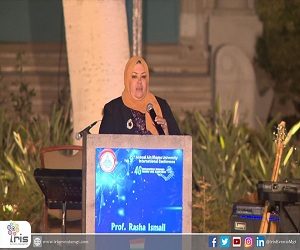 |
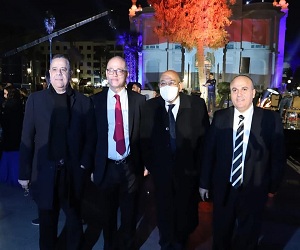 |
|
Third, the Medical Sector
Prof. Dr. Osama Mansour, Vice Dean for Postgraduate Studies and Research and Medical Sector Coordinator announced the recommendations for the sector.
The recommendations were as follows:
The recommendations included a focus on consultants from the developing world. Systems evaluation application. Promote college development programs of a professional nature, by improving infrastructure, equipment and first training in all medical fields, activating the role of psychologists and social workers to train students to combat bullying behaviors and dealing with victims with psychological treatment methods, supporting institutions in electronic empowerment and training workers on methods of combating bullying against institutions and people on social media, amending the necessary legislation to confront the phenomenon of bullying and establishing a mechanism for legal and social deterrence, deploying convoys to areas that suffer from lack of services, with a focus on assessing needs and linking them with local activities, expanding the scope of telemedicine services for patients and following up and consulting Medical service providers, improving the dynamic management of medical facilities and services, focused research of healthcare services according to needs.
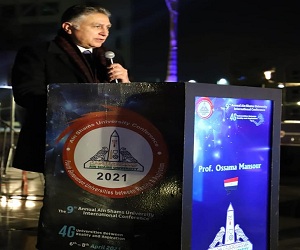 |
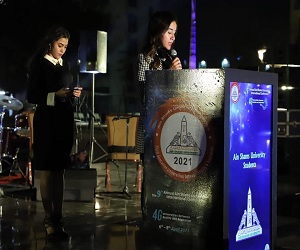 |
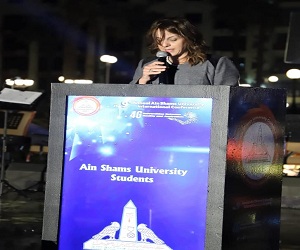 |
||
Fourth, the Human and Social Sciences Sector
Prof. Dr. Hayam Wahba, Vice Dean of the Faculty of Business for Postgraduate Studies and Research and coordinator of the committee declared the recommendations of the Human and Social Sciences Sector, which included:
Fourth-generation universities adopt a mission and vision based on “leading the development and development in society” and not only based on “meeting the needs of society”.
Fourth-generation universities assume their responsibilities towards disseminating and promoting a “digitalization culture” to support sustainable development plans in society.
Fourth-generation universities adopt a system of governing values that are not only based on “producing and creating knowledge,” but also “spreading knowledge” and “finding appropriate applications for that knowledge.”
Fourth-generation universities develop the concept and methods of measuring Employability, which is reflected in the programs, curricula and skills provided by these universities.
Presenting an ambitious "Egyptian" model for fourth-generation universities that reflects the national identity and achieves global competitiveness.
Changing the strategic orientation of the Egyptian universities to include three dimensions: "international publishing", "innovation and property rights", and "applied projects" in a way that works to finance universities from industry and not from the state budget.
The universities adopt a national program "Alliances of Science Valleys, Entrepreneurship and Technology Incubators" that brings together universities, industry and community organizations to achieve sustainable economic growth.
Contributing to the development of legislative and legal frameworks that help universities enter the fourth generation universities stage to ensure global competitiveness.
A radical change in the programs and courses offered by universities works to enhance the "knowledge, skills and capabilities" of their graduates in a way that allows competition in global labor markets.
Promoting a culture of “risk management” in universities and learning lessons learned from the occurrence of the Corona pandemic.
Seeing “internationalization” and “international partnerships” as a means to achieve the goals of universities and not as an end in itself.
Universities create a "brand" that allows them to have international partnerships that are reflected in their capabilities to attract students, researchers, and projects, and to achieve global competitiveness.
Fifth: Basic Sciences Sector:
Prof. Dr. Mohamed Montaser, Vice Dean of the Faculty of Science for Postgraduate Studies and Research, stated the recommendations of the sector, which included:
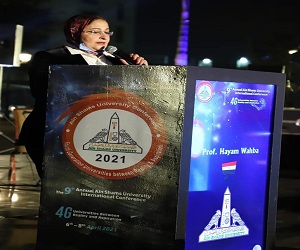 |
 |
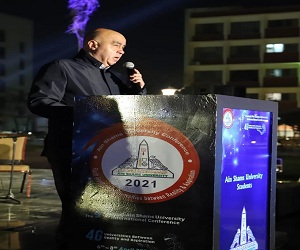 |
||
Maximizing the benefits of mineral wealth in Egypt by developing new methods for detection and extraction of minerals, the use of laser spectrum technology to monitor environmental pollution in a short time frame, and the expansion of the use of nanomaterials hydroxyapatite ( Hydroxyapatite) and nanotechnology in integrating bone fractures, preparing a clear time map for the stages of implementing digital transformation in parallel with placing it on the map of large data centers for commercial and industry research, improving the production of scientific data for colleges, increasing and developing the fish farms industry to bridge the gap between production and consumption, proposing a model to improve the concept of future organic aquaculture systems, popularizing modern agriculture in Egypt as an alternative to traditional crops that consume large quantities of water, increasing investments in infectious disease research and vaccine development technologies, highlighting the vital link between health and all aspects of basic life, increasing cooperation between industry and academia.
.svg)



